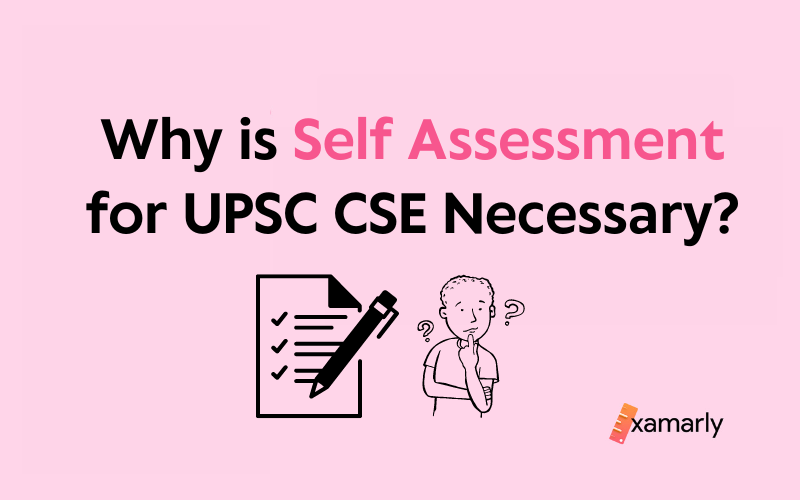Self assessment for UPSC is meant to increase the responsibility and regulation of aspirants in learning. Preparation materials, research, weekly targets, and analysis are the fuel to self-assessment.
If you are an aspiring candidate who is studying day and night to clear UPSC Prelims, you may have questions like-
- What are your strengths and weaknesses while preparing for UPSC?
- Where do you need additional emphasis?
- On which questions are you spending more than usual time?
- Have you divided questions section-wise like current affairs, polity questions, history, or geography?
- Have you checked the structure of answer with the answer key?
Self-directed learners & other aspirants can easily answer such questions by assessing themselves. UPSC preparation dictates that candidates have to self-assess and set milestones. This article delves deep on why self assessment for UPSC is required.
How Does Self-Assessment Help You Clear UPSC?
To clear the most prestigious UPSC Exam, just subject knowledge is not enough. Time Management for UPSC, handling pressure, and various natures of question with ease are also important. They play an equal role to clear the UPSC exam with flying colors.
Self assessment plays a key role in analyzing all these listed factors so that you can strengthen your problem-solving skills. In short, evaluating your preparedness from time-to-time helps you prepare in a well-targeted manner.
By evaluating yourself, you give way to improvising your learning and your performance in mock tests and the final exams.
Related Article: How Many Mock Tests Before UPSC Prelims.
Benefits of Self Assessment in UPSC Preparation
Self assessment for UPSC not only figures out your strengths/weaknesses but also improves your performance. The benefits of self assessment in IAS Preparation are as follows:-
- It helps you know which topics you are good at and which areas need your attention.
- It identifies the loopholes, if any, in your preparation.
- It helps you to identify the mistakes to avoid in UPSC so that you will not repeat them further else such mistakes may stop you from clearing.
- With it, you will come to know whether you are achieving a targeted goal or you have to work more to achieve it.
- With it, you are able to know whether you are on a right track or not.
- It helps you speed up your preparation and also enables you to evaluate your problem-solving skill.
In short, take out time for jotting down your mistakes in your UPSC Prelims or the Mains preparation to channel your energy in the right direction.
Also Read Our Comprehensive Guides On:
Importance of Self Assessment for UPSC
Self-assessment is a significant part of UPSC preparation strategy.
Periodic self-assessment tests help aspirants prepare for UPSC CSE in an effective manner. Basically, it scales the level of Civil Services preparation by taking mock tests.
It is important as candidates get aware of their skills and abilities to solve any questions, their interests, and many more. It helps in boosting the self-confidence of the aspirants. It helps them keep their progress in check which helps in retaining the necessary information in your memory.
As in life, no one pushes you, similarly it’s your desire to be an IAS officer, so you have to push yourself. For this purpose, it is essential to be on a right track after removing all the hurdles that might block your way to success.
Related Article: Critical Thinking For UPSC Exam Preparation.
Attempt the Test Series for UPSC Exam as Frequently as Possible
Any UPSC aspirant should attempt the test series for UPSC exam as frequently as possible due to the following reasons:
- To score as high as you can: The first and foremost reason to take the test regularly is that it helps you score higher in the examinations. The more practice you get, the higher your confidence levels will be, thereby translating into better scores.
- To get familiar with the trend of the past few years: You should know how previous year question papers were set and what kind of questions were asked in them so that when you appear for the actual exam, you do not get caught unaware by any questions thrown at you. Even evaluation of answer sheets using an answer key will benefit in the long run.
- To feel calm, confident, and poised when you actually answer the UPSC question paper: The best way to do this is by practicing the previous year’s question papers with complete accuracy and speed so that when the actual test comes, one feels at home with it. This will also help aspirants get rid of any nervousness or anxiety when facing exams in the future.
- To assess yourself among your peers: The test series gives you a chance to see how well placed you are among other candidates who have appeared for the same test series. This will help you evaluate your strengths and weaknesses and accordingly plan out strategies to improve upon those aspects that need improvement for the main test.
It also gives you a detailed analysis about how much preparation is needed to reach a certain standard. - To sharpen the memory: The test series covers all possible topics that may appear in the civil services examination. Practicing helps sharpen your memory so that when it comes to facing the real thing, it becomes easier to recollect facts and figures.
You Might Also Like To Read:
How Examarly Helps in Self Assessment for UPSC?
The UPSC Exam is tough & highly competitive, and compounding your efforts will make you more successful than others. UPSC preparation needs to be well-planned, so plan with help from Examarly.
Examarly believes in checking your preparation by an area-wise analysis and then making necessary changes. It takes your self-assessment and accordingly provides you with a customized micro study plan to give an edge to your Preparation.
Conclusion
Self assessment helps you analyze yourself at various levels of your preparation. This analysis gives you an idea of how close are you to the target. It also helps to find & solve major loopholes and constraints of your preparation with the right strategy. It helps you to enhance and synergize your efforts.
It is the cornerstone of all successful effort to prepare for the exam, and no matter how well-researched a study plan may be, it can only be effective when taken with a dose of self-evaluation.
You Might Also Like To Read: UPSC Preparation Tips From Toppers.
FAQs on Self Assessment for UPSC
How can I assess my preparation for UPSC?
You can assess your preparation for UPSC by taking mock tests, practicing previous years’ question papers, and analyzing your weak areas.
What are the important components of self-assessment for UPSC?
The important components of self-assessment for UPSC are: understanding the syllabus and the UPSC exam pattern, regularly taking mock tests, practicing previous years’ question papers, analyzing your strengths and weaknesses, and working on your weak areas.
How often should I take mock tests for UPSC?
It is recommended to take mock tests regularly, at least once a week, to assess your preparation for UPSC.
How can I analyze my weak areas through self assessments?
You can analyze your weak areas in UPSC self-assessment by keeping a track of the questions you are unable to answer accurately, identifying patterns in your mistakes, and dedicating sufficient hours of study required for UPSC to those areas.
How do I improve my performance in UPSC self-assessments?
You can improve your performance in UPSC self-assessment by dedicating more time to your weak areas, taking mock tests regularly, practicing previous years’ question papers, and seeking help from a mentor or a study group if necessary.






